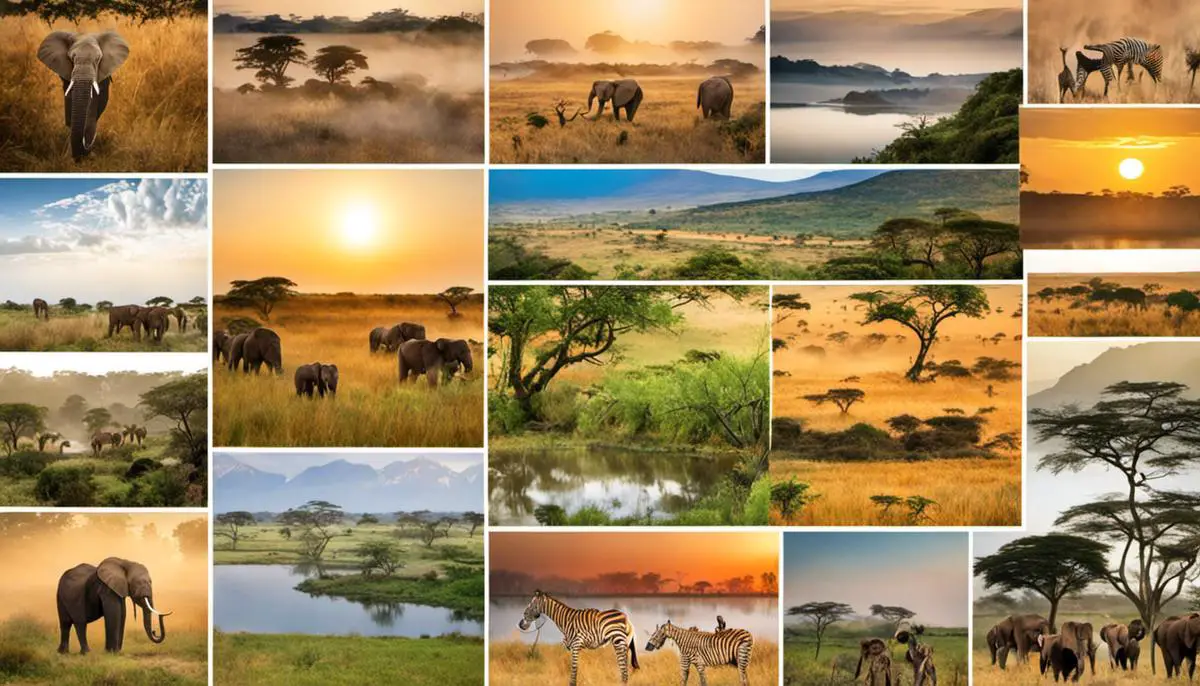A continent steeped in history and abundant in cultural diversity, Africa is home to several countries where English is widely spoken. Nations like Nigeria, Kenya, South Africa, Ghana, and Tanzania, to name a few, showcase the profound influence of colonial roots intertwined with indigenous norms, which consequently brought about a remarkable prevalence of English.
This exploration sets itself to delve into the rich facets of these English-speaking African countries by drawing a clear picture of their historical context, cultural spectrum, and the unique attributes of ‘African English,’ a beautiful offspring of linguistic amalgamation.
Table of Contents
- Intro To African English English-Speaking Countries
- Historical And Cultural Context Of English Speaking African Countries
- Experiencing English-Speaking Africa: Local Vibes And Tourist Attractions
- Tips And Tricks For Travelling In English Speaking Africa
- Related Questions
Intro To African English English-Speaking Countries
Embarking on a vacation through Africa can be an enriching experience filled with vibrant cultures, stunning landscapes, and an unexpected blend of languages. Among the continents’s diverse linguistic palettes, English surprisingly stands out as a commonly spoken language. Today, let’s delve into the prominence of English in Africa and discover the central English-speaking countries there!
Historically, Africa had its brush with various European colonial powers and lived quite an era under their influence. English rose from the echoes of this past, courtesy of Britain’s expansive colonial rule. The British Empire, in its heyday, spanned numerous African territories, instilling English as the administrative language.
Over time, this foreign language started taking root, blending into local cultures, education systems, and governance. Despite gaining independence, many countries kept English as an official language due to its international recognition, aiding cross-border communication and trade.
An interesting fact: Despite being a non-indigenous language, English is now spoken by a staggering number of people across the continent. In today’s globalized world, English is a unified language for many African countries.
So, wanderlusters, ready to tour English-speaking Africa? Let’s jump into some prominent countries that will welcome you with English greetings!
So, globetrotters, armed with your linguistic compass, now you’re all set to explore these diverse English-speaking African territories! Remember, the essence of travel is not solely in the language spoken but in the conversations shared, friendships forged, and the memories created.
Let’s keep wandering, keep exploring, and, most importantly, keep learning. The world is a book, and those who do not travel read only a page. Happy adventures!

Historical And Cultural Context Of English Speaking African Countries
Digging Deeper: The Unique Flavors of African English
Let’s plunge into the continent’s heart, where the pulse of life beats to a rhythm as diverse as its cultures. Africa, the cradle of humanity, has a rich and varied linguistic landscape reflected in its distinctive variants of English – each tinged with its unique flavors lent by native tongues and centuries-old traditions.
Venture into Nigeria, the largest English-speaking nation in Africa, and you’ll be met with Nigerian Pidgin English – a vibrant mix of English, Portuguese, and indigenous languages, evidencing the country’s multifaceted culture and complex history.
A meander around the buzzing streets of Lagos might have you hearing phrases like ‘How body?’ instead of ‘How are you?’ — a question that reveals a subtle connection to the people’s closely-knit communal values.
Journey south to South Africa, and you’ll experience a language seasoned by eleven official languages – an actual linguistic rainbow. The English here is a delightful blend of Afrikaans, Zulu, Sotho, and more. Expressions like ‘Is it?’ instead of ‘Really?’ and ‘Robot’ for traffic light perfectly encapsulates the nuances that reflect South Africa’s vibrant diversity.
Head over to Kenya and be taken on a linguistic safari with “Sheng” – a hybrid lingo that blends English, Swahili, and indigenous languages. Like its wildlife, Sheng is wild and free-spirited, evolving and adapting with youthful energy and creativity, revealing a lively, street-smart culture in urban Kenya.
Ghana shines in the West with its unique brand of English steeped in Akan language traditions. Don’t be surprised when asked, ‘You are going?’ instead of ‘Are you leaving?’ – a twist that hints at the vital role community takes in shaping language.
Down in Botswana, you’ll encounter Setswana-infused English, or “Setlish.” Here, brimming hospitality is reflected in the standard greeting ‘Dumela,’ a courteous acknowledgment of another’s presence, underlining the respect central to Batswana culture.
Finally, Zimbabwe’s Shona and Ndebele imbued English showcases an intriguing interplay of British English and local dialects. Lovely phrases like ‘I will come and sit with my feet at you’ or ‘Let’s give him a long hand’ emerge from translations of local idioms, painting a beautiful picture of Zimbabwean customs and philosophies.
English in Africa is a captivating tapestry woven with threads of intricate histories, vibrant cultures, and indigenous languages, painted with a palette rich in local colors. Each nation proudly brings its unique take on the global language, a mélange of expressions, utterances, and inflections that make traveling this magnificent continent truly an immersive linguistic adventure.
So slip into those wanderlust-filled shoes, dust off that trusty notebook, and set off. Each corner of this continent has a linguistic treasure waiting to be unearthed. Learn more than just the language — soak in their incandescent spirit and the stories behind their words, and witness how history and culture have shaped the incredible, diverse flavors of English across Africa.
Burst those language barriers, not merely to communicate but to connect. Let the languages of Africa speak to your soul, for the real voyage of discovery is not in seeking new landscapes but having new eyes.

Experiencing English-Speaking Africa: Local Vibes And Tourist Attractions
Delving deeper into the African continent, it’s all about the bold, the beautiful, and the incredibly unique experiences that can be explored. There’s something magical about adventuring off the beaten path and discovering the unfiltered charm of English-speaking African nations. Let’s shed light on a few places that will indeed make an indelible mark on the hearts of those brave enough to embrace the African spirit.
Starting in magnificent Kenya, one cannot overlook the Masai Mara, home to the awe-inspiring, world-renowned Great Wildebeest Migration. It’s nature’s stunning, untamed ballet that takes place annually between July and October. Let’s not forget about Kenya’s sparkling beaches like Diani Beach, a tranquil tropical paradise palm-fringed with pristine white sands.
Next on the list is Ghana, where history is touchable. The tragic yet must-visit Cape Coast Castle and Elmina Castle bear witness to the untold horrific slave trade era. A complete contrast is the joyous, vibrant city life in Accra, with its bustling marketplaces, incredible street food, and jubilant art scene.
Moving on to Botswana, unparalleled wildlife viewing awaits. The Okavango Delta invites the intrepid dreamers to navigate the floodplains on a mokoro, a traditional dugout canoe. The Chobe National Park offers rich wildlife sightseeing, with a chance to watch herds of elephants bathing in the incredible Chobe River.
Uganda famously recognized for its gorilla trekking opportunities in the Bwindi Impenetrable Forest, is a wildlife enthusiast’s dream. A rafting experience on the roaring River Nile at Jinja will undoubtedly satiate the adventurer in you.
Heading to Zimbabwe, a nation brimming with natural wonders, one can gaze upon the grandeur of Victoria Falls, a bucket-list staple for many. There’s also the Great Zimbabwe Monument, remnants of an ancient African empire that piques the interest of history buffs.
In Liberia, surfers can find their paradise on the consistent waves at Robertsport, a premier surfing spot with few tourists in sight. And the capital, Monrovia, stands as a living testament to Liberia’s challenging history and current rebuilding efforts.
While exploring these places, immersing in the local Africa-infused English – from the Pidgin English of Nigeria to the Sheng lingo of Kenya – can make the journey more fulfilling. Learning the language nuances is part of the immersive cultural exploration. African languages have powerfully influenced English in these countries, leading to charismatic variations that embody local life and heritage.
In conclusion, there’s a universe to explore within these English-speaking African nations. From the history etched on ancient castle walls to a safari across the Savannah, Africa is an enigma just waiting to be unraveled. Each country has its story, uniqueness, and incredible way of life – don’t forget to pack your sense of adventure and curiosity.
These lands are a song, a story, a dance; all you need to do is listen, read, and move with the rhythm. The richness of Africa is vast, and the only way to understand it is to be a part of it. So pack your bags, open your heart and mind, for there’s no place like Africa.

Tips And Tricks For Travelling In English Speaking Africa
Digging Deeper: Sailing Smoothly Through English-Speaking Africa
Sure, the previous basics provide an indispensable kickstart, but hey, no journey’s complete without a sprinkling of whimsy, a dollop of unplanned encounters, and a good literacy of the locals’ ways.
Consider these tips not just as a survival guide but as that trusty compass leading to the vegetable patches of authentic African experiences. Shall we take the plunge?
In this continent of endless hospitality, socializing is critical to a smooth journey. Engaging with locals in their everyday settings, from informal markets to bustling taxis, helps mold the essence of true African memories.
And since we’ve been on the languages route, don’t muzzle the linguist in you. Pick up a few local phrases as you navigate the part-Pidgin, part-English street argots of Lagos or the Setswana-infused chatter in Gaborone. Who knows, a little ‘e Karo,’ a cheerful ‘dumela’ might be your ticket to impactful interactions.
Weather is a quintessential gatecrasher in African adventures. The dry harmattan winds up north, the fleeting yet fierce rains down south, or the toasty equatorial climate in the heart could stir up your plans unexpectedly. Stay pre-armed with weather awareness and tailored gear, blending in the practical with a stylish pinch.
Africa by road is essentially a blissful daydream – surreal landscapes whizzing past, fleeting glimpses into the countryside life, all to the rhythm of the tro-tro or local minibus.
However, infrastructure across the continent can be varied, from smooth tarmac highways to bumpy terracotta trails. Thus, patience, a spirit of adjustment, and a readiness to embrace the unexpected become critical travel mates.
Why limit your stay to hotels when you can breathe in amazing Africa through community homestays? A typical family house in Accra or a local’s nest in Harare deepens your understanding of daily African life, customs, and traditions.
And yes, don’t shy away from those delightful kitchen sessions. They may just secretively turn you into a fine chef, spicing up your meals with a mix of Ugali from Kenya or Jollof rice from Ghana.
The twain of health and safety must never be lost in your African escapades. Yet, their definitions may vary across the continent. While you’d be advised against the tap water in some regions, you’d be just fine sipping away in others. Local advice is critical here; they are the actual Google maps marking the safe zones of your journey.
Sensitive travel gives you brownie points! Africa’s environment and wildlife are a treasure trove to be experienced, respected, and preserved. Ethical wildlife tourism is an absolute thumbs-up! Say ‘yes’ to exhilarating safaris in the Okavango Delta but ‘no’ to questionable wildlife interactions. Advocate for responsible tourism and tread lightly on Africa’s precious ecosystems like the Masai Mara or the Bwindi Impenetrable Forest.
Wrapping things up (not literally because, hey, we’re not about summaries here), every corner of Africa sings its song, each chord tuned to the harmonious symphony of its cultural heritage, diverse ecosystems, and ethereal beauty.
Factoring in these essential tips and tricks, carrying a pocketful of curiosity, a sprinkling of courage, and a heart full of respect, your journey across English-speaking Africa can be as smooth as the Zambezi’s flow. Happy wayfaring, dear nomad!
Submerging oneself into the infectious rhythm of Africa and its English-speaking countries not only widens the scope of knowledge and cultural understanding but also aids in facilitating deeper connections with its warm-hearted inhabitants.
From the thrill of lively cities, the grandeur of natural landscapes, and the richness of local culture, the experience is purely transformative. Armed with practical travel tips and a beckoning spirit of adventure, begin your remarkable voyage of discovery in the heartlands of Africa, where every country has its own story to tell and a unique rhythm to share.
Let the marvels of English-speaking Africa enchant you, and may your roving feet eternally be curious and wild.
At A Bus On A Dusty Road, we talk about everything about travel, life, sailing, and ex-pat living. We are all about “Living Life As A Global Citizen.” We explore social, cultural, and economic issues and travel.
We would love to have you be part of our community. Sign up for our newsletter to keep up-to-date by clicking here. If you have any questions, you can contact me, Anita, by clicking here.
Listen to our Podcast called Dusty Roads. You can find it on all major podcast platforms. Try out listening to one of our podcasts by clicking here.
Subscribe to our A Bus On A Dusty Road YouTube Channel filled with great videos and information by clicking here.
Related Questions
What Is The Difference Between U.S. And North America?
The United States, often abbreviated as the U.S., consists of 50 states. On the other hand, North America is a continent that includes not only the U.S. but also countries like Mexico and Canada, among others. Let’s delve deeper into the nuances that differentiate the United States from North America.
By clicking here, you can discover What Is The Difference Between U.S. And North America?
Was George Washington The Richest Man In America At Some Point?
George Washington was undoubtedly a wealthy man of his time, but records suggest that Benjamin Franklin and Robert Morris may have outdone him in the riches department. While their wealth is well-known today, both men had extraordinary financial clout during Washington’s era – making them two potential powerhouses of money back then richer than George Washington.
By clicking here, you can discover Was George Washington The Richest Man In America At Some Point?
What Is The Biggest State In America?
Alaska is the largest state when you look at land mass. It is also one of the least populous states. The most significant state population is California, but its land mass is not as large as Alaska. Alaska and California have fascinating histories about how they became part of the United States of America.
By clicking here, you can discover What Is The Biggest State In America?

